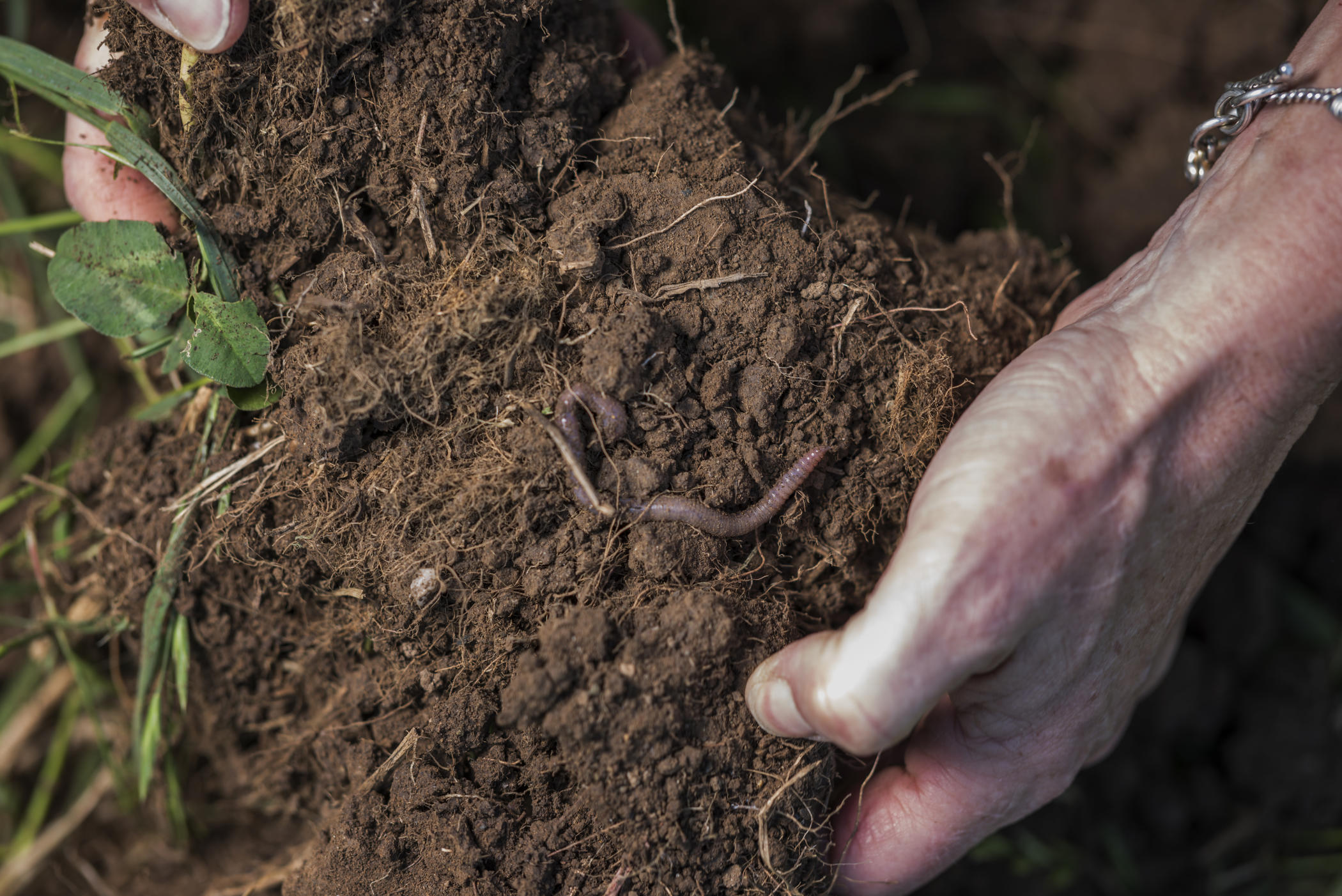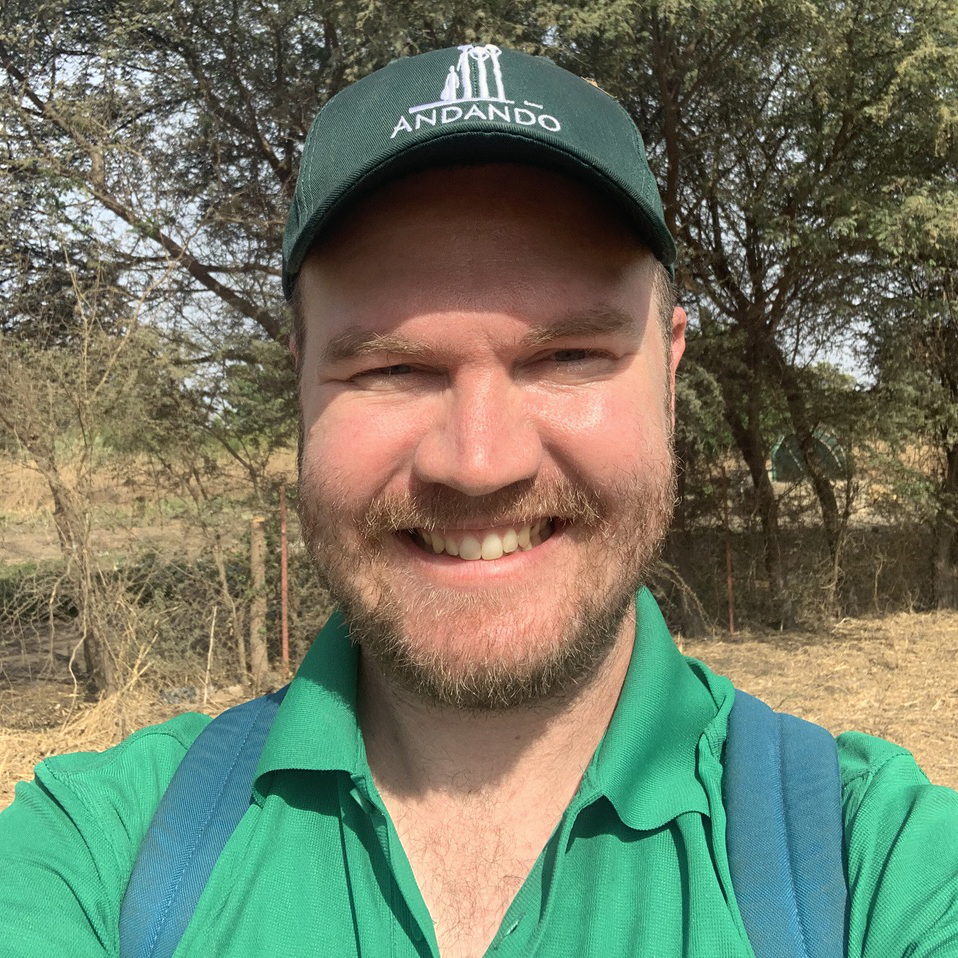Five Questions with Alumnus and Micro-Farmer Garrison Harward

A worm in the handful of soil in the grazing pasture at the University Farm is part of the regenerative soil program that makes efforts for sustainability farming possible. (Jason Halley / University Photographer)
When Garrison Harward (Musical Theatre, ’10) is not working as a head lighting technician in theater and fashion—implementing lighting for events for Ralph Lauren, Chanel, Prada, Gucci, and Hermès—you can find him pulling weeds and planting seeds. He started gardening in his Brooklyn neighborhood seven years ago to get to know the community and share his love for growing food. With the support and guidance of local leaders, he took over the old community garden and built it into a hugely productive urban micro-farm that now grows more than 100 kinds of vegetables and herbs, all free for the community. He draws on personal gardening experience and his international agricultural work in the Peace Corps to show the community how much can be grown in a small space, which has become a gathering spot for his block. And he gives away hundreds of pounds of produce each year. Neighbors contribute different seeds and techniques from all over the world, making the farm a connected and diverse space that truly reflects the people who cultivate and consume the produce. Follow Harward’s progress on Instagram.
How did your interest in gardening start?
My mom and grandfather have always been big gardeners. Spending weekends planting and tending to small livestock was the norm. It becomes a part of your identity and something to look forward to every year as you plan which new varieties to try and what to improve upon from previous years. And Chico State definitely helped to instill my passion for learning. I had some great professors who really opened my eyes beyond my small-town upbringing. That’s what lead me to join the Peace Corps and then move to NYC with nothing but a suitcase and a dream.
Has gardening been a respite for you amid the challenges that theatre has faced during the pandemic?

Entertainment workers were the first to be laid off and the last to get their jobs back. It was a really difficult time. New York City was hit really hard during the initial wave of COVID-19, and I was spending 48 hours a week volunteering with the Red Cross, which was fulfilling but taxing. The time I spent in the garden with my community was healing during those times and kept me from isolating and falling into depression.
Why is it so important to connect with your community?
How could it not be important? I think a lot of people move to NYC without thinking much about the people they are displacing or the neighborhoods they’re moving into. If you move into a community, you should contribute in some way. Gentrification is fueled by short-term renters with no real commitment or connection to the areas they’re moving into. Get to know your neighbors, get to know the needs and desires of your community, and even if you can’t make things better, don’t let your occupancy make things worse for folks who might want to live there for decades to come.
How and why did you get involved with the Andando Foundation in Senegal, and what does that relationship look like?
I first met with the Andando Foundation during my service in the Peace Corps. We kept in touch, and they followed my garden’s progress through the years until we got to talking about adapting my gardening work to help their women’s cooperative gardens. Climate change is causing increased desertification and topsoil loss in Senegal, making subsistence farming more and more difficult for people there. We are using some of the regenerative permaculture techniques I’ve been learning about to help their farmers improve soil health and overall yields. I’ve traveled back to Senegal twice already and plan to go back to implement a new aquaculture project in the gardens to raise tilapia and catfish. Check out their amazing work!
What advice do you have for people who want to try their hand at gardening?
Do it! Start small and don’t be discouraged by failure. Experienced gardeners fail all the time, they’re just prepared to pivot to a new crop and try again. Don’t worry too much about techniques or systems. Plant what you want the way you want, and make adjustments from there. As my mom used to say, “Seeds want to grow—just put them in the ground.” And when you’re ready, buy the book Dirt to Soil.


